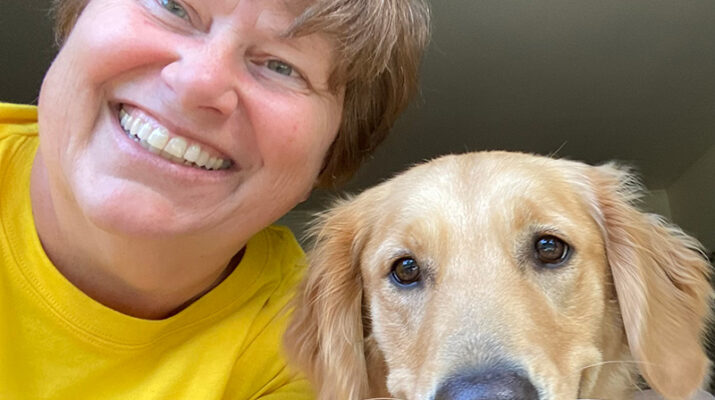By Deborah Jeanne Sergeant
Cancer survivors all have a different story, as everyone’s journey in life and cancer is unique. Nonetheless, most say that their experience has given them a new perspective on life after undergoing the devastation of their diagnosis, the struggle to select their next step, their treatment and their recovery.
The support of family, friends and their medical team helped in ways they never expected.
Sue Schwartz of Rochester received her breast cancer diagnosis in 2017 after a routine mammogram.
“It totally came as a shock as there was no history of it in my family,” Schwartz said. “I have been a very active person, never sick a day in my life. I didn’t believe it.”
A biopsy and second opinion convinced her. She discussed her options with her care team. A lumpectomy would not remove all the cancer as it had infiltrated the ducts. Told that it could metastasize soon, she decided to undergo mastectomy with TRAM flap surgery reconstruction. The surgeon uses tissue from the lower belly area to form a breast shape before placing it in the breast area.
“The recovery was worse than the whole shebang,” Schwartz said. “I had drains in my chest and belly that had to be emptied. I’m really squeamish.”
Because of her early diagnosis and successful surgery, chemotherapy was not warranted. Schwartz receives mammograms annually.
“I couldn’t have had a better team of doctors working on me,” she said.
She also feels gratitude for friends living nearby who helped her through the ordeal. She works part-time as a coordinator at the American Cancer Society Hope Lodge, which provides housing for people who need cancer treatments in Rochester but live farther than 40 miles away.
“Get as much information as you can,” she tells people newly diagnosed. “Have a really good support group.”
Deb Havert, 57, of Canandaigua, also received a breast cancer diagnosis in 2017 after a routine mammogram.
Mastectomy was the best course for treating Havert. Further testing after her surgery indicated that chemotherapy and radiation would not make any difference as to whether or not she would have cancer again.
“Initially, I had a lot of panic attacks and just felt uncomfortable in life, in living with myself,” she said. “I was constantly anxious and not being able to find anything that brought me any comfort.”
She stayed at Hope Lodge for a month, as her home at the time was in the Adirondacks, far from the level of medical care she wanted. Since then, she has not experienced any recurrence.
Havert takes hormone-modifying medication which can affect bone health, so she regularly receives bone density tests and at first received infusions to improve her bone density. She also follows up with her oncologist regularly.
Havert tells anyone newly diagnosed to “be your best own advocate. Make sure that you ask questions and don’t be afraid to question the doctors and nurses. The best that you can grasp a hold of what’s happening, the more comfortable you’re going to feel with your choices.”
She has discovered that creating visual artwork has proven a comforting activity. She has also developed more confidence in public speaking as she promotes the importance of mammograms.
Man Recalls Struggle with Prostate Cancer
A retiree from Rochester, who asked that his name not be used, received his prostate cancer diagnosis in 2019.
“It was pretty shocking,” he said. “I was seeking other insights for a doctor. It just occurred to me I never had a PSA test done. I was 69 years old.”
To his surprise, his prostate-specific antigen was elevated indicating prostate cancer. His was the aggressive type.
“That was the scariest night, trying to keep anxiety under control,” he said. “I thought I might be dead in a few months or a year, but everyone’s cancer is different and I wasn’t educated about treatments.”
He chose surgery over radiation, as that would better allow him to receive radiation if he needed it. Going for radiation first may have meant any warranted surgery would be more difficult afterwards.
“I presumed that there was emotional support connected to the surgeon’s office,” he said. “I asked if he had a list of support services. He said, ‘Not really.’ I was shocked.”
He felt himself slipping into depression about his surgery’s side effects. After prostate surgery, many men become at least temporarily incontinent and impotent, although these may improve over time.
An online search led him to seek help from the Rochester chapter of Us Too for men with prostate cancer. The group offered valuable moral support, along with The Reluctant Brotherhood, a wholly online group, whose irreverent humor encouraged him.
Last year, his PSA was on the rise, so he received radiation. His providers continue to monitor his PSA.
“It’s a precarious place to be,” he said.
He tells anyone newly diagnosed to “be your own best self-advocate. Assemble a good team of healthcare providers. You need to read the literature, be fully informed for possible treatment options. Some guys are adamant against surgery. There’s watchful waiting if the numbers aren’t that high, radiation, prostatectomy, brachytherapy, where they implant radioactive seeds.”
He said that information from reputable online sources like the Mayo Clinic can be helpful also.
“Cancer changes your whole perspective,” he said. “You appreciate your life one day at a time. We always say these are areas we should have improved in before cancer but cancer wakes you up to it.”

